If it wasn't for the ongoing support and understanding of Hou Wanxia, I don't think I would have stayed in China so long. She is my shelter in a storm, and the encouraging voice in my head when I face demoralising attitudes or apparently unsurmountable challenges. I was excited to get news from VSO last December that they wanted to invite a Chinese partner to London to represent China's education programme at a corporate fundraising event. Here is the article Hou Wanxia wrote that won their hearts. Unfortunately the event was cancelled due to lack of support, but I still hope to arrange a UK trip for Hou Wanxia, especially now she has her passport (one of the many barriers to leaving the country). 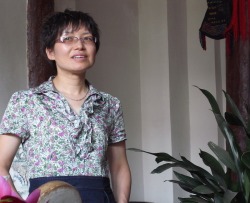 Hou Wanxia in Ninger I am an ethnic minority girl—Qiang nationality - and the luckiest girl among my 16 cousins (16 girls out of 21 cousins), for my father was Han nationality and he got a job as civil servant in our County seat. This meant I got the chance to go to school, a chance that many children in my family didn’t get. When I finished junior middle school, my father told me that I could go to high school if I passed the entrance exam. I succeeded. I then went on to college, followed by university. I am, up until now, the only girl with a university diploma among the 16 girls in my big Qiang family. Of my fifteen cousins four are illiterate because of poverty and sex discrimination. Four finished primary school, two half-finished primary school, three got through junior school and only one went to high school.
After graduating I became a junior middle school English teacher. There was an informal regulation in my school that young female teachers who were not married could not have equal chances to further education. Male teachers had the opportunity to finish their higher degrees in university but we could not. This was because because most female teachers would transfer their jobs after getting married. I was eager to go to a normal university to improve my English teaching ability and, of course, to realise my dream of being a well-educated person. Every year I handed in my application for the entrance exam to be admitted to an open ‘normal’ university to major in English education. It took seven years for the leaders to finally approve my application. This was as a result of my persistence and my high teaching results — both my junior and senior students’ entrance exam results were the highest in my County. No university or no marriage, that’s the choice. In our culture there is great pressure to marry young. Not getting married early with your family’s support may seem impossible for many young women. You know, as a result of this regulation, most female teachers give up on their jobs, their own careers, and get married.
After my seven years of big effort I realised my dream of going to university, but this had a cost: I got married and gave birth to my daughter at a very old age according to our culture. I was so old to become a wife and a mother at thirty, especially in Yunnan, a remote mountain area of China with twenty-six ethnic minority peoples.
With the university diploma, however, I got the job as a teacher in Simao Teacher’s College in Puer city. My main responsibility was to teach Middle School English Teaching Methodology to English teaching majors. I still have this job today. It really was a big challenge for me at first, to change my role from that of a middle school teacher into a College teacher. As before, I put my heart and soul into studying, to find the right ways to do this job. As you know, however, China is an old country with a very long history of “teacher-centered” ways. This has been, and still is, the one and only popular way to teach every level of student, from primary to secondary, to university. Over the years it has been too hard for me to find any better ways to teach these pre-service students and nobody could help me because all of the teachers work independently, separately.
In 2001 our country began its national educational reform, calling for new methods for the “New Curriculum” and a more humanistic education. But nobody knew how to start this totally new thing in a totally traditional situation. As the methodology course teacher, I worried so much about how to solve this problem and I tried something new I had never tried in class before - I asked students to do some group work after class, as homework, and to present their work in the next lesson. I recognised this to be a good start. It was only part-time “student-centered” but how could I deliver all my lessons in a purely “student-centered” way? This seemed impossible to me. It really was a challenge and I simply didn’t know how to do it.
When Lesley, a VSO volunteer from the UK, came to our college in 2005 with her family, my opportunity came too. She introduced the aims of VSO: to share skills and to improve lives. She showed me her great willingness to work with me and to co-teach my methodology course. Co-teaching, what’s that? It was so new to me, to everybody in our college, and perhaps to our nation. When I decided to try this new thing, all of my colleagues were so surprised. Some doubted, some displayed very negative attitudes towards me and Lesley. Even the students were surprised and doubtful in the first class. After a short time, however, they loved our co-teaching. Both the students and me benefited so much from this cooperation of ours. They themselves learned how to cooperate, learned how to take responsibilty for their work, becoming more and more positive and creative. We all learned how to reflect on our work and our lives.
It is Lesley who helped me understand the true meaning of “volunteer”. That is: someone who is always ready to give you their hands when you need, without hesitation; someone who is devoted to the work they choose, without complaint; someone who contributes their energy, their skills and professionalism, selflessly; someone who will not give up easily. Here I should say, “Thank you VSO, for sending us such a great volunteer, for saving my work, for giving me a chance to help save so many young souls from the murderous traditional teaching methods of our country, by showing them the right methods—humanistic methods”.
Over these five years Lesley and I have been co-planning, co-teaching, co-training, observing, reflecting and discussing. We have been like two swimmers struggling against the tide, trying our best to show sound results. We have led the way to co-operation, led the way to use new teaching methods—student-centered methods, led the ways to develop the “PIE” project with the help of VSO’s support. Their biggest support has been sending us such a professional trainer - Lesley with a great personality, who made proposals, wrote training workbooks, training plans, delivered the most training course, did the most follow-up. She has visited sixty-five countryside schools and directly helped two hundred and twenty-five rural middle school English teachers. Of them one hundred and eighty are women and two hundred are ethnic minority, meaning they often have fewer chances in education. More than one thousand teachers from other subjects have observed new teaching methods in Lesley’s demonstration lessons and more than eight thousand poor countryside students have been lucky enough to have a lesson with such a ‘humanistic’ teacher, a chance that they might not otherwise have had in their life.
Again, I want to thank VSO for giving me such a chance to learn about rural schools and education with our PIE project. It is the follow-up trips with Lesley that led me to the countryside, to discover the real situation for rural schools. I was shocked so much by the difference in development between city schools and countryside schools - so unbalanced: the former are in heaven compared to the the latter, which are often in hell, in terms of the conditions of teaching and learning, living and playing. I feel so sorrowful and sad for the rural school students and for the teachers. Firstly, it is rare for the teachers to get a chance to receive methods training and to get basic knowledge of education, such as an understanding of pedagogy and psychology, of how to treat children properly. Most of the teachers are unqualified and desperately need relevant guidance. What’s more, female teachers get fewer chances to take training and to study. Most of them don’t have the chance to fight the discrimination. Secondly, not every child can get have the chance to go to school in the first place because of their poverty, especially girls, who are kept on at home to help. As I said before, I was a lucky one. Not everyone is so lucky. Luck isn’t enough. We take our luck and add hard work. This way we can make a difference. VSO has made an immeasurable difference to my life and I can make such a difference to others in return. I hope all the children in the rural areas of Yunnan can have this same chance or at least the right to go to school.
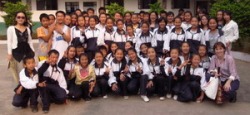 Lesley with Class 122 Two of our Grade 3 students attended the Team Leader-Trainer training course closing meeting last term, with some of their middle school students. They had completed their teaching practice at this school and found that the students responded well to their communicative methods and student-centred approaches. They shared their experiences with the Team Leader-Trainers and I promised to visit the school to meet their classmates. I finally made it yesterday and Sue came too.
Although we were all piled into the classroom for a 'meet and greet' session, it was fairly informal. We introduced ourselves, showed photos, asked and answered questions and generally got a feel for the teaching and learning environment. As usual, the children were lively and excited in the playground, but instantly settled into a fairly passive classroom mode once inside. Fortunately there were a few noisy, energetic children who couldn't contain their excitement and kept the momentum going. It's always easy to pick out the students that the teachers normally rely on to answer questions. They are the first to call out, put their hands up and come to the blackboard. What's more, the other students usually look at them, waiting for them to answer. It was a shock to some of the students not to be ignored, especially some of the boys at the back who, I sense, are used to being spectators.
Nevertheless, the children did really well. They were attentive and tried hard to understand and follow our short activities. While some of the students didn't understand what was going on at times, there were absolutely no discipline problems. I'm not sure if the same would be true if a Chinese visitor confused and perplexed a group of British teenagers mid-afternoon.
Sue and I were asked students to sign autographs for the students. The first time students asked me to sign my name I felt really uncomfortable, a feeling Sue also expressed yesterday. I still think it strange that my name should be so special or valuable to them. It's a humbling experience. I don't feel so uncomfortable now but still embarassed that they should think me so important. I know, however, that the students appreciate the gesture. I usually add a happy face or words of encouragement, to make the scribble a bit more meaningful.
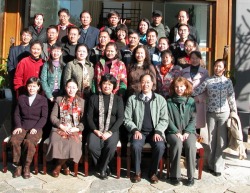 The 2009 Teaching Committee retreat I was delighted to be the beneficiary of inclusion last weekend, when I was invited to attend the College Teaching Committee weekend meeting in Simao's tea hills. As you know I've been working for years to develop the College curriculum and extra-curricular activities for teaching majors - authentic teaching practice, teaching clubs, peer teaching, among other things - but have never been included in any meetings or discussions on the subject. Even with the formal establishment of the TDC as a working centre for training and research, there has been no acknowledgement to me of my role in that. I feel like a ghost. I felt like a ghost, until this weekend. We were driven by College bus to a beautiful hotel within the grounds of the Yinpangshan tea estate, East of Simao. I could smell the tea trees from my room and the glass-walled veranda on the second floor allowed one to see for many miles, over the hills towards Laos and Burma.
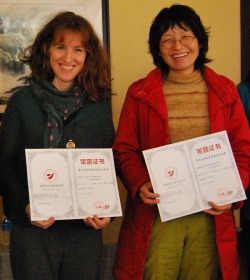 Another surprise for me was receiving an "Honour Certificate" for my co-teaching work and research with Hou Wanxia. We put a proposal together over two years ago and prepared an application and reports on the basis of our undergraduate teaching methodology course. A few other people's names are on the certificate (one of them cut out of this photo) who did absolutely nothing to support this work. In fact, one of them tried to sabotage it at every opportunity - criticising our student-centred methodology to other teachers and students, undermining the aims of the course to the students themselves and telling me it was "ridiculous" to teach anything other than oral English - apparently all that foreign teachers are qualified to do. She didn't flinch as she received the award and I wondered if she even saw the hypocracy of her actions, or of her snatching from Hou Wanxia an undeserved cut of the 2,000 yuan prize. This is the way it is. Leaders are respected for their ability to suck up to those that matter, not for their integrity or fairness. We don't matter, not to her anyway. I'll leave here and the injustice won't affect me any more. I am relieved, however, that Hou Wanxia's fabulous efforts are at least being recognised by the College leaders, if not by her colleagues.
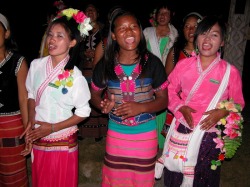 On the evening of our arrival we played ping-pong and posed for photos among the tea bushes before dinner. The meal included several wild plant dishes and an apparently never-ending supply of red wine, olive wine, rice brandy and black rice liquor. The latter was my favourite and I was longing for all the other diners to come and toast me so that I had an excuse to drink. One doesn't really sip here. It's more a toast and down-in-one approach to drinking. Fortunately the Dean of Biology was into the sweet tipple so we just carried on toasting each other.
The alcohol was a good relaxant so everyone was primed for some wa nationality dancing round the campfire with these local girls. The evening was rounded off with me having a bit of a rap/street dancing session under the light of the dying embers with the wa girl in the middle. The other party-goers had left by then, or at least so I thought. Ma Li (art department friend) and Mr Sun (Chinese department, new comrade in arms) accompanied me back in a golf cart. It was a memorable evening and I awoke with the smell of wood smoke in my hair, as did the rest of the Teaching Committee.
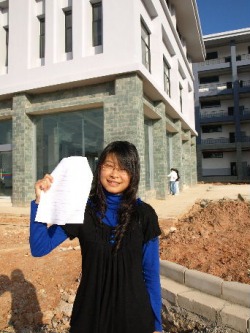 Sunshine is about the only thing on the side of the Grade 3 students now that they are finally back from their teaching practice and living (or perhaps we should say 'squatting') at the new campus. Due to lack of space at the old campus, the Grade 3 students have been forced to inhabit this building site ahead of time. They have no hot water for washing and inadequate canteen facilities meaning they often go without hot meals. The teachers are grumbling too, as they have to take the bus from the town out to the campus every day for classes. At least the College is providing a free bus service to tie in with class times.
This morning Ali took a bike ride out to meet Cindy, one of the class monitors, to deliver the Teaching Practice Feedback & Evaluation forms that Lesley gives to the students every year. It's especially important this year as it's the first time since 2006 that the English Department resorted to the usual teaching practice set-up of minimal preparation and minimal support of TP students. Given that Lesley has data from all four PIE teaching practice groups (160 students in all) she will be able to make a direct comparison between the nature and quality of teaching practice for PIE and non-PIE students. So far it's not looking good for the non-PIE conditions - most of the students we spoke to this time only taught about 5 lessons (compared to an average of 120 for PIE students!) and experienced many social challenges like pressure to drink. With PIE teaching practice groups Lesley ran life skills workshops before they left for placements, to help them prepare for such challenges. Pre-teaching practice agreements and on-going correspondence with the Education Bureau and Middle Schools also meant that we could keep these problems to a minimum. She was very disappointed that the English Department, under new leadership, refused to cooperate or continue the PIE activities and approach to supported teaching practice. The one consolation is that it's a good research opportunity. Let's hope that the data supports the belief that PIE is the way to go!
 Visitors to the TDC these days get to open the advent calendar for, you guessed it, a mini Dove chocolate (best quality!). The TDC is a hive of activity these days, even more than usual, as Hou Wanxia has been formally promoted to the post of Director of the Teaching Development Centre. While she's flapping around trying to put together 3-year work plans, reports, proposals etc, I'm digging out versions of these documents that I've already prepared. It's quite funny really. A visitor asked this morning, "So, what will the TDC do and where will Hou Wanxia's office be and who else will be part of it?" I had to laugh. Hou Wanxia will continue to work with me, Tina (until January) and the new volunteer, in this office, doing the work already underway and developing new activities, that are also already underway. gWe also hope to start up a few new research projects, like a teaching model/experiment (with me as the teacher) in local schools. As it happens, I am happy to do everything I can for Hou Wanxia. I will hand over all my materials, documents, resources, reports and anything else that can help her in this new role. I'll be the secret force that guides and supports her, probably the thorn in her side too! She has a lot of eyes on her but this formal recognition of her efforts and capabilities has been a long time coming.
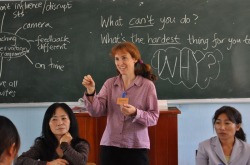 Training Zhenyuan and Jingdong TLTs. We write about our travels, our family life, health problems and work. We write about people we meet, things that bug us, culture, food, money. In fact, we write about almost everything except how we're really feeling. We write this blog to keep you up to date with what we're up to in China, give you a sense of what it's like to live in China, to create a picture of the VSO experience. The truth is that for me the hardest thing about being here isn't the squat toilets, the work pressures, the dangerous roads, pollution on Ninger Avenue, the two-facedness of the Dean of English. The hardest thing is the social and professional isolation, and the loneliness. I've felt isolated and lonely before, but I have had other mechanisms of support, other ways to manage this. Here I feel more restricted. Now that my Chinese has improved I can talk to people at bus stops or when I pop into a shop. I can greet our neigbours and chat about the weather. When it comes to more serious things like how the kids are getting on at school, or how many more hundreds of swine flu cases there are in Simao, or increasing traffic and dangerous driving, our would-be reference groups are non-existent. We sit with the parents and grandparents at pick-up time but most of them can't get beyond the, "oh, can your daughter understand the teacher?" or "can you use chopsticks?" to get to the things that really matter. It's lonely and hard dealing with these things on our own.
One doesn't need to be standing next to a best friend to lighten the load. It's sometimes enough just to know that others feel the same worries, the same pressures, have the same questions. Maybe it is true here, but it's hard to access. Either people don't open up much, or they just don't open up to us. I suspect both is true. I was recently asked by SAFEA (State Administration for Foreign Affairs) to complete a "knowledge test". I'd say 'general knowledge' except that it wasn't. It was mostly facts about the USA and Chinese culture, with the odd bit of maths thrown in. One of the questions was: "Would you generally describe the Chinese people as...(a) excited (b) outgoing (c) supressed (d) lively?" I opted for supressed, though I know it varies according to place, person etc. Maybe I'll lose my job for this somewhat negative view but where we see excited, outgoing and lively people it tends to be in a crowd, expressing drilled sentiment like jia you ("come on!") next to a basketball court. I find it hard to have a heart to heart because people don't often express their own feelings.
I'm still here, still doing my job, still smiling and making the most of life, but when I fall asleep and wake up in the morning, it is often with a heavy heart. If I think of Scotland, if I think of Freda being ill, if I think of many things, I feel profoundly sad. I'm homesick and probably have symptoms of mild depression but it's hard to leave. I love my job. I have a job. We have a home and the children have a reasonably happy life. Ali doesn't have a job but is writing a book and seems happy to have escaped the 9 to 5 routine of the BGS. We spend the holidays travelling to fascinating places and exploring rich and interesting cultures. We have a couple of friends who know a little part of us and accept us for who they think we are. That's as good as it gets in many cases. The fact that half of our selves are shelved back in Scotland may be irrelevant. Every environment forces one to compromise in one way or another. So what's the problem?
I'm lonely and isolated. That's hard to manage sometimes. There are emotions behind the mask and that's a very real part of this VSO life.
I hadn't realised how expressive katydids were until Ali got up close to this little chap with his macro setting - easy to miss on our cactus plant, sitting outside the kitchen window. It's the season for bright green insects and there are lots of praying mantis about too. It takes nerves to get up close to them though.
Nerves are a little bit tense at the moment as various pressures mount: Freda seems to be unwell again, Edie has developed a cold and my work is piling up, as usual. Uncertainty about what is wrong with Freda is hard to deal with over a long period of time. She was much better last week and managed the new morning school routine. We've emailed the VSO medical unit in London, as well as a few other medics, and we await advice and suggestions.
As to the old work chestnut. Well, I know I could lower my expectations on that front, and simply do less, but that's easier said than done when there are so many people asking for help in one way or another. Nevertheless, I am trying to stick to a reasonable working day - get to the office by 8, have an hour or so for lunch then work on until 5 or 6, assuming I'm not in charge of home school that day. I'm also prioritising. The result is that this week is being devoted to completing a TLT training report, enter the TLT feedback and evaluation into a database and finalise a digital PIE Resource Package for distrition to anyone who wants it. That's not bad given that I've been asked to teach two model lessons at Simao No. 6 Middle School and run an English singing activity with Edie's class. I have put on hold the job-hunting, 20+ replies to middle school penpals, TLT follow-up preparation and trips, article writing and College workshop planning, never mind all the things I'd love to do but haven't even started - bookmaking classes, this term's orienteering programme, cooking club etc etc. Hobbies? I'll consider those again on Saturday. The good news is that by the evenings I'm too tired to do anything but flop on the bed with a book (on bad days it's the couch, with a DVD) and have opted to start more seriously studying Chinese again. Oh, does that count as rest??
 Teachers, students, leaders and Jinggu Education Bureau gave us a warm welcome when we arrived in the small township of Zhengxing on Sunday evening. This banner, hanging from a balcony of the teaching building, read: "Welcome VSO and Simao Teachers' College experts to guide us in our work."
This trip to a Jinggu County school was organised to give our VSO visitors and clearer insight into our work here in Simao. We carried out a two-day follow-up visit that included teaching observations, a model lesson by me (Lesley), an English Corner, various meetings, various meals and even a bit of karaoke at the end. Henry, one of our recent TLTs, led the observation feedback session - the start of our TLT follow-up this term. Hou Wanxia and I led the main part of the school meeting in the afternoon. As well as being a good opportunity for VSO to meet our key partners, it was a chance for us to bring them together round a table - Education Bureau leaders, school leaders, team leaders, VSO, Simao Teachers' College and teachers. It's not often we have the opportunity to talk directly about our goals and challenges.
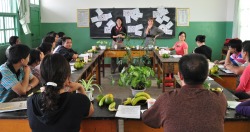 One of the more challenging but definitely most rewarding parts of the day was the school meeting. I divided participants into groups, according to their jobs. Each group had to come up with their key targets then write, on pre-prepared arrows, how they were going to achieve these targets. Each group gave feedback and the other groups were invited them to ask questions. I also asked each other group if they thought the targets were realistic, and whether they would support them. Mr Chen, the Vice Headmaster of the school, was unusually direct with the Education Bureau when he turned to them and said: "It's unusual for us to have such Education Bureau office directors here. In fact, we hardly ever see you. What support are you going to give us in the future to help us achieve these aims?" I was thrilled to see the school make the most of this chance to communicate and make some demands. It's rare. At the end I gave a speech, with Hou Wanxia interpreting, which involved me at one point getting down on my hands and knees and begging them to put this theory into practice, not just turn their backs at the first challenge they meet. It was clear that some progress had been made since my last visit in 2007, but not nearly enough.
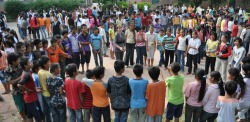 The school requested that I paid a visit to every class. Even if this were physically and mentally possible it would take, with an average of 5 minutes per class, about two hours. As an alternative we decided to get all the students out onto the playground for a few English language activities. Each English teacher was given an orange and sent to a class. Each class stood in a circle and passed the orange, saying something in English when they caught it. In my group [above] we progressed from "My name is...." to "I like...." and "I don't like..." They were very shy at first, desperate to avoid having the orange passed to them. This wasn't just because they were facing me, a foreigner. The other groups were reluctant too. They're simply not used to playing such activities - semi-structured with room for free-thinking. Free-thinking carries with it responsibility and the potential for 'making mistakes', every student's worst nightmare in the Chinese classroom. Delighted that we managed to get this enormous English Corner off the ground, and that the kids gradually and happily warmed up and took part, I didn't of course correct any English mistakes. The aim was communication and they achieved that very successfully. The orange was a little battered and bruised but that was the only casualty. I'm just sad I couldn't get round all the groups. To finish off we gathered the school together to teach them Head, Shoulders, Knees and Toes, which we all sang and did the actions for. With over 570 people present, that's definitely my record. My throat was hoarse by the end.
 As you know, stolen moments to play pingpong with primary school children are always a highlight for me on these trips. This one was no different, but I was in for a special treat. After playing with the Primary 3 - 4 kids for 20 minutes I suddenly found myself opposite a familiar face. I played pingpong with this little boy in December 2007. I instantly recognised him and was delighted that he'd pulled himself away from his basketball game for a re-match. He didn't give much away but I knew he recognised him, and sought him out later for a photo. It's unlikely that I will have the chance to visit most of these townships again. As this school wasn't even part of the follow-up, it was a real surprise to meet and old friend. Now that I have his name, I'm going to print up our pingpong photos and send them to him.
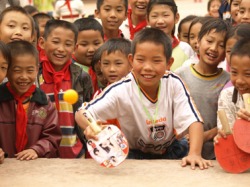 Pinpong boy during our China-Scotland match in 2007, as I passed through Zhengxing Primary after my follow-up visit to the nearby middle school.
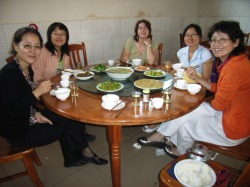 Lunch at our favourite Muslim restaurant These days we are delighted to have two visitors from VSO - Li Hongyan, the Senior Education Programme Manager (left) and Wang Yanhui (second left), the Education Programme Support Officer. Hongyan and Yanhui arrived last night and got up at the crack of dawn to attend the teaching observations in No 4 Middle School, along with the TLT course participants. Tina gave the first model at 7:30, followed by Lesley at 8:30, after she'd dropped Edie at school. Hou Wanxia and Lesley led the observation feedback meeting afterwards and were pleased to hear some useful and poignant reflections. As the course draws to an end, we PIE trainers are making our own reflections on how it's going, whether it's a success and what challenges we face.
Hou Wan xia says: "It's the second time for us to have this TLT training and with the efforts we have made, it's much better. In particularl, Lesley rhas been re-writing the training materials and adding the Chinese translations for tasks and the general introduction for the course with the purposes and the goals and, in class, Lesley tries all kinds of methods to elicit the teachers' thoughts. This is very hard for our Chinese fellows to change their minds because changing means they will have to pay more attention to their job. They will deny what they have done in the past. It means they have to use a lot of time to prepare the lessons again and, of course, the big challenge for them is whether to change or not. Their biggest challenge is actually their attitudes to their jobs. Why should they change? Why should they work so hard with such poor pay? They think it's unfair on them. They are afraid of being pioneers, of trying something ahead of the others. It means taking a risk. What's more, most of the teachers have taught for many years. That means that every teacher has developed a set of habits in their job. It's not easy for them to change their ways immediately. They need time to think and to be pushed. Meanwhile, they need a kind of power from above, to tell them that they HAVE to do something. That is the way of our Chinese fellows."
 Ali visited my training workshop today to snap a few pictures but found it hard to catch me motionless. This picture was the best, with only one arm flapping up and down at high speed. I'll have to slow down....
The trainees are into their second day of full-on activities and are already coping better with the methods and requirements of the course. I'm trying my best to keep the structure of each session simple and logical, with key points written on the BB and translated into Chinese by the participants themselves. Nevertheless, some teachers are concerned that English is a barrier (even if they are all English teaachers) and gets in the way of them understanding. After doing this work for over four years however, I don't believe this is as big aThe main challenge for most teachers is their study habits. Even when instructions are given in Chinese (all tasks have been translated into Chinese in the workbook) and they have a clear model, many teachers find it difficult to fully complete the tasks - mainly because almost all the tasks involve thinking and reflecting. These are new study skills for many of the particicpants. It's convenient to say, "I can't do it because my English is so poor" but it's an easy way out that reflects the learning culture. The fact is, I speak very little English in class and when I do it's usuallly instructions or simple questions, which I offer in Chinese if participants show signs of confusion! My response to the "my English is very poor" statement is: "If you don't understand, say so"; "If you don't understand, think about it more or discuss it with your partner"; "If you don't understand, ask the trainer to repeat the point or give a model." The difficulty the trainees have with asking a trainer to repeat something, or saying, "I don't understand" may well be culturally rooted. To put it simply, it's a cultural taboo to publically point out a teacher's weaknesses - and that is how a question might be interpreted. It might be like saying: "I don't understand because you are a bad teacher". Secondly, it may be taken as a sign of the trainee's own weakness or failing, like saying: "Look at me, I'm so stupid I can't understand what she means". So, if trainees don't understand, they tend to just sit and wait for someone else to tell them the answer, or for the trainer to write it on the blackboard. Another problem is habit. After 10+ years in education and similar leader-centred work environments, many teachers don't know how to cooperate, how to discuss and work together. Very often, when asked to have a group discussion, they sit and scribble away in their workbooks on their own. Making sure everyone understands is certainly a challenge, but only a small part of that is about the verbal language although this is always the excuse they fall back on. It's about culture, about habits, about attitudes, about behaviour. What really matters is what we do with the language, the context in which we use it, the part we play in trying to understand and trying to be understood. I'm trying my best to make this process as easy and effective as possible. This afternoon I'll have a chat to the participants about what THEY need to do to be more active learners.
|



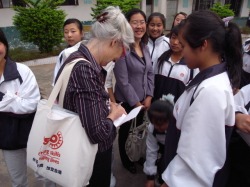















 RSS Feed
RSS Feed